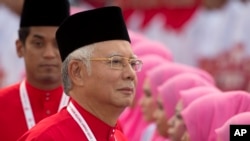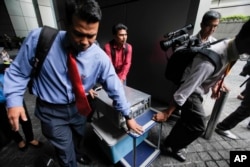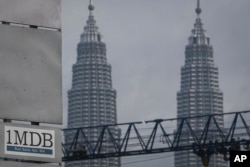A financial scandal involving Malaysia’s prime minister continues to cast a shadow over the country’s financial markets and politics a year after allegations of misuse of funds were raised.
The spotlight fell dramatically on Malaysia’s state investment company, 1Malaysia Development Berhad (1MDB), after media reports last year raised allegations that millions of dollars were deposited into the private bank account of Malaysian Prime Minister Najib Razak.
Najib has repeatedly denied any wrongdoing and the Malaysian attorney general saying the funds were a personal donation from Saudi Arabia’s Royal Family.
But in the past week, an Abu Dhabi sovereign fund announced 1MDB was in default of its obligations on $1.1 billion in debt and interest.
Risk for markets
Malaysia’s Ministry of Finance quickly responded it would honor all commitments in financial markets linked to the fund and would “have ample liquidity to do so.”
But Bill Case, a political science professor at Hong Kong’s City University, said the scandal may hit Malaysia’s financial sector and economy in the months ahead.
“This IMDB scandal is so serious and the amounts of money so large that if the fund defaults – which it appears it may do in the next few days – and if the government then has to come in and guarantee, it will deal such a blow to that country’s entire financial system,” Case told VOA. “And this will put pressure on the [local currency] Ringgit once again. It doesn’t look good. That’s just the beginning of defaults – there will be a whole succession of them,” he said.
Weak international oil and commodity prices – with Malaysia a key exporter – led to a 20 percent fall in the Ringgit last year.
Case said the cost to the economy could eventually reach between $10 and $20 billion, or up to six percent of Malaysia’s national output (GDP). “For an economy the size of Malaysia that’s just a real body blow,” Case added.
Divided opposition
The scandal and allegations has long triggered calls for Najib’s resignation. Former Malaysian Prime Minister Mahathir Mohamad earlier this year joined with political foes urging the Prime Minister to step aside. Mahathir, who led Malaysia for 22 years, has also launched a lawsuit alleging misuse of power.
But the political opposition remains divided, with leading political figure, Anwar Ibrahim, serving a five year jail term for sodomy.
In denying the allegations, Najib also moved against any investigations by Malaysia’s former attorney general, replacing him with a loyalist. In February, incumbent Mohamed Apandi Ali ordered Malaysia’s anti-corruption agency to close its investigation of the prime minister.
But the scandal has led to probes in 10 countries – from Malaysia to the United Kingdom, the United States and Switzerland – over allegations of political donations, inaccurate disclosures, possible money laundering and embezzlement.
Test of strength
Najib’s governing Barisan Nasional coalition is preparing to face a crucial political test in Sarawak state elections, on May 7, for the 82 member state legislative assembly.
The prime minister is counting on the popularity of the state’s chief minister, Adenan Satem, to retain support for the governing coalition.
Case says despite the funding scandal risking an erosion of support, the governing party should win the election.
“Najib will survive in office. And he will win the election in Sarawak handily. And after that Najib will be able to say, 'You all see I am popular in Malaysia and this is how they show their favor to me,’” he said. “That’s why I say [Najib] will last in office but the economy will continue to slide,” Case said.
Krystan Tan, a Singapore-based economist with the independent research company Capital Economics, said the IMDB scandal has cast a pall over the political outlook. But Tan says despite these uncertainties political stability – at least in the short term – is assured.
“The big picture for us is still that we don’t – we still think that the risk of actual, genuine political instability is still pretty low in the short term,” Tan told VOA. “We still think that the prime minister has a pretty good grasp of his ruling party and we’re not going to see a change in leadership to the election in 2018. So in terms of policy direction we’re still going to see the status quo for now,” she said.
The World Bank has projected an easing in Malaysia’s economic growth over 2016 to around 4.4 percent from 4.7 percent, with weaker private consumption.
Despite the reported default and failure to meet the interest payment of $1.1 billion on the loans taken up by 1MDB, the fund’s president, Aral Kanda, told Bloomberg newswires an “amicable resolution” to the matter is underway.
But the World Bank, in a commentary on the economy, said tightening the budget and resolving political issues would help “reassure foreign investors and cope with the heightened external vulnerability.”






